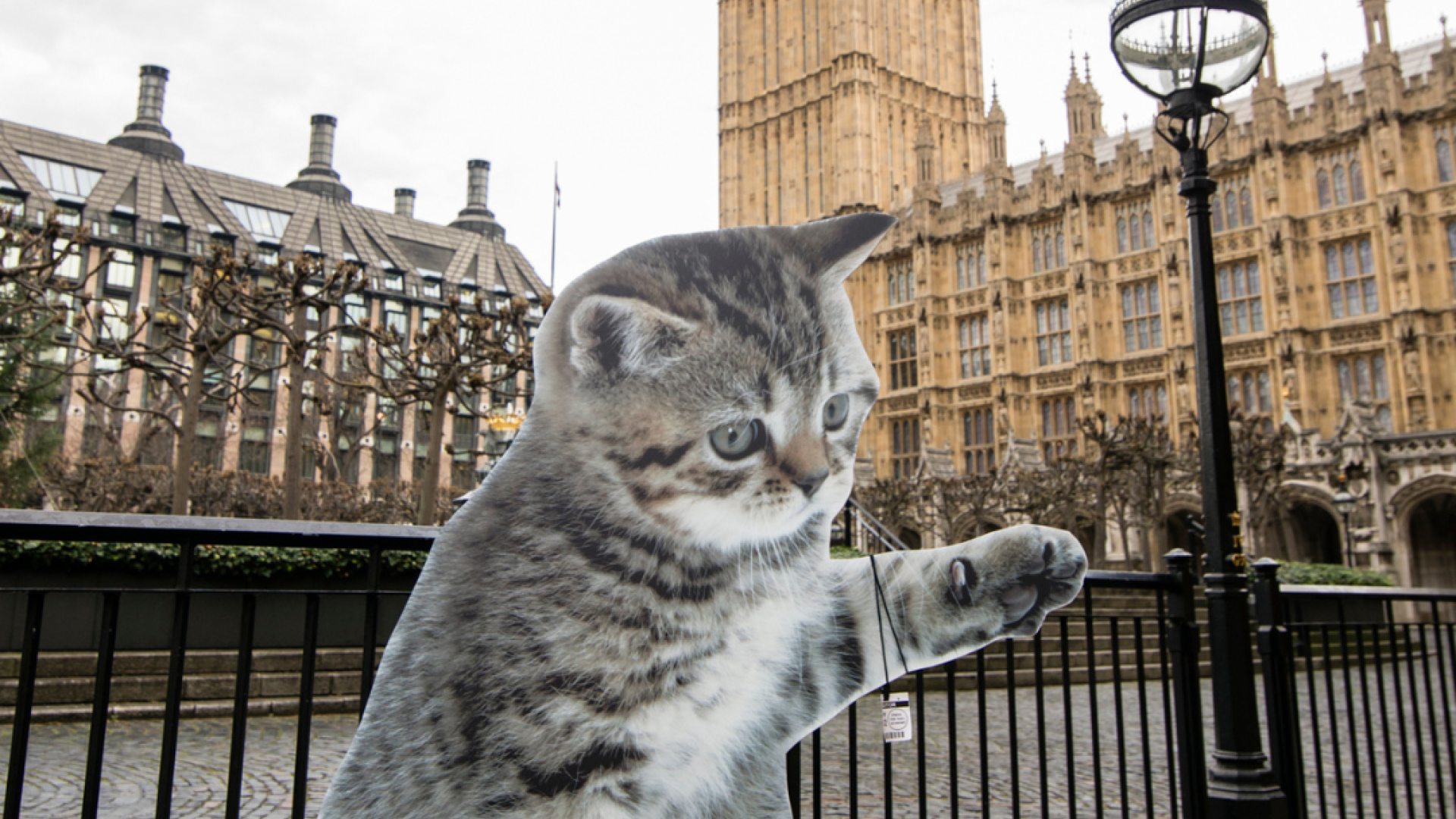As we explored in our free campaigning report last year, engaging MPs can rely on a huge amount of strategy, and some charities can find it difficult to break through the noise and make themselves heard in these arenas. One charity that has managed to consistently make their message heard is Cats Protection, who in recent years have managed to successfully capture and hold the attention of MPs, and advocate for the needs of pet-owners across the UK. This week, we're joined by two members of the Cats Protection team who are sharing their top tips for enacting effective change: Madison Rogers, Head of Advocacy, Campaigns & Government Relations, and Stefan Blakiston-Moore, Advocacy & Digital Campaigns Manager.
Campaigning for change is serious work, but that doesn't mean you can't find creative ways to engage MPs using attention-grabbing tactics. As Madison explains:
"Being creative can help your organisation standout, think about what your charity’s vision and ‘unique selling point’ is and use this innovatively in your engagement. At Cats Protection we would never take real cats into Parliament as this would be very stressful for them and could compromise their welfare. Instead we have attracted attention at events with a giant 6ft cardboard cat that MPs can have their photo with [Pictured above]. We have used different cats over the years and ran competitions to name the cat to increase on-going engagement.
Being creative also doesn’t have to be done through a prop. Utilising a local connection to an MP in an innovative way can make your charity more relevant to the MP and lead to better engagement."
Campaigning with the public can be an effective way to make the most out of your supporter base. But, as Stefan tells us, this requires careful implementation and consideration before you jump in:
"Within the animal welfare sector, public ‘email to MP’ style campaigns continue to be widely used, with MPs often stating they receive more correspondence on this area than other issues. MPs receive a significant level of correspondence but with careful consideration and alignment with public affairs objectives, it can still be an effective method in the right circumstances.
The key to this is considering the ask of the target of your campaign – making it specific such as linking it to an event related to the issue, or highlighting how the issue has a local impact – e.g. is there a local statistic or case study that could be used to resonate with the MP, as opposed to just highlighting an abstract policy ask."
MPs have busy schedules, and it can be frustrating trying to get the most out of brief meetings, or knowing what to expect from a given opportunity. Madison tells us how she manages her expectations while making the most of the face-time she gets:
‘When deciding what kind of engagement you are looking for with MPs to meet your organisations strategic objectives, set your expectations accordingly. If you are arranging a drop-in event, MPs will come and go, which can lead to high numbers of turn out but conversations might be short. If you are able to make your engagement approach at a relevant time, such as when a debate on a topic your charity is campaigning on is taking place, it is more likely an MP will engage. Through anticipating the needs of MPs your engagement can be tailored to ensure it is relatable."
We're always thinking about how our research can help charities to campaign more effectively. Stefan told us how data-driven storytelling is core to engaging the hearts and minds of MPs and fellow supporters to get them behind the importance of your cause:
"At some point in a campaign you will inevitably be asked something along the lines of ‘what evidence is there’? Evidence based campaigning is of course a significant ethical consideration in its own right, but it is important to consider how data can help your case. Being able to take a spreadsheet of data, working out what the data is telling you and building a narrative are important skills to have within an organisation.
Also consider the significance of rhetoric and how to weave together data with the pathos of real-life case studies; while you might occasionally find a few statistics that have the ability to stop someone in their tracks in their own right, often the impact of combining information with a real-life example will be more than the sum of its parts.
For example, Cats Protection’s data consistently tells us that there are around a million households that would like to have a cat, but can’t due to restrictive policies from landlords – when combined with a case study of a cat that has had to be given up to Cats Protection because of the lack of pet friendly rental properties, the significance of our argument is much greater."
We're incredibly thankful to Madison and Stefan for sharing their insights with us - we're always looking to help charities achieve their campaigning goals and appreciate the chance to share some tried and tested methods from a team that has first-hand experience of what works. Check out their blog for information on taking care of our feline friends, and for opportunities to support pet-ownership across the country.
If you're looking to learn more about our work with MPs and how our research could help you campaign more effectively, consider downloading a briefing pack below, and remember to check out our free campaigning report for more insights.

